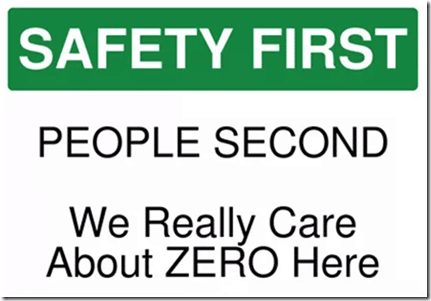What If I Valued People And Not Safety?
 When organisations say that their number one priority is safety, it can have some unexpected outcomes. Setting, and stating, organisational priorities and values is a wicked problem to begin with. Nothing is neutral and everything has meaning, so when “safety” gets chosen as the poster child of priorities, it can get messy.
When organisations say that their number one priority is safety, it can have some unexpected outcomes. Setting, and stating, organisational priorities and values is a wicked problem to begin with. Nothing is neutral and everything has meaning, so when “safety” gets chosen as the poster child of priorities, it can get messy.
Part of the challenge here revolves around what “safety” actually means. I find that it is very rarely stated. So the meaning is left as exformation (Norretranders’ term for the unstated, and often unconscious, meaning that is added in by listeners when they hear words and messages as information).
Typically though, in the current world of measurement and data, safety is about the absence of harm. So what organisations value, or set as their number one priority, is the absence of harm. Sounds good, but it comes with a price (much of which has been covered in debates on this forum around zero harm).
Because people are fallible, eventually someone will get hurt. Or even without fallibility, because we live, we will suffer some harm of some sort. So eventually someone will be seen to fail to meet the priority of safety. When we value/ prioritise safety, we focus on the outcome, not the person. We are setting people up to fail.
What if, instead of safety, we said that people were our number one priority? Does this dilute the safety message, or in fact allow a dual focus of, we value people and so we don’t want them to get hurt? Of course, and in fact it actually carries more meaning because the context of not wanting harm to people is directly related to our care for people.
Too often I hear comments that organisations just say their priority is safety because it looks good to the outside world. This is actually a reflection of the lack of meaning that people attribute to the statement.
Could we then maintain a situation where we can care for someone who may have been injured, or made a mistake, and still not be happy that they got hurt or made the error? Of course, but because our priority and value is focussed on the person, it has more meaning.
We can say “I’m not happy you got hurt because I care for you”, as opposed to “I’m not happy you got hurt because safety is our number one priority”. The second statement leads us to blaming and punishment. The first statement leads us to stronger connection, and if we ask the right questions, greater understanding.
Dave Whitefield – Director – People and Risk – www.peopleandrisk.com



Do you have any thoughts? Please share them below